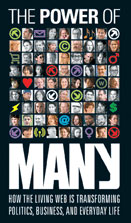 A couple of months ago, Christian Crumlish gave me a copy of his just-published book The Power of Many (How the Living Web Is Transforming Politics, Business, and Everyday Life). I’ve known Christian for a lot of years — back when Birdhouse was primarily an arts collective publishing “new media” works by artists discovering the web for the first time, he invited me to join antiweb (ironically no site currently online) — a loose collective of web developers scattered around the world, trying to find the capabilities and limits of the new medium. Christian, a writer of dozens of computer books, also ran Enterzone, an online literary e-zine.
A couple of months ago, Christian Crumlish gave me a copy of his just-published book The Power of Many (How the Living Web Is Transforming Politics, Business, and Everyday Life). I’ve known Christian for a lot of years — back when Birdhouse was primarily an arts collective publishing “new media” works by artists discovering the web for the first time, he invited me to join antiweb (ironically no site currently online) — a loose collective of web developers scattered around the world, trying to find the capabilities and limits of the new medium. Christian, a writer of dozens of computer books, also ran Enterzone, an online literary e-zine.
Christian’s latest book is not only his first to appear in hard-cover, but also his first that’s not a technical/how-to; rather, it’s an exploration — at turns straightforwardly journalistic, nearly stream-of-consciousness, and scholarly — on the transformative power of online communities. Crumlish goes behind the scenes not technically, but anthropologically, examining how weblogs and wikis, social networking sites, web services, SMS, discussion groups, flash mobs, etc. have transformed the way people gather and organize, both online and in meatspace. And he chronicles his involvement in the web-savvy Dean campaign, his deep roots in the Grateful Dead scene (whose online existence in many ways mirrors the ethos of the Dead culture), wanders through topics ranging from spontaneously self-organizing micro-communities to well-funded corporate and political action groups.
On first discovering online journals, most people find them puzzling, a paradox. Who would put their private diary online? … Omigod, my mother read my blog! Indeed, there are countless stories of people who misjudged the effects of putting their thoughts and ideas into the public domain and who lived to regret the confidences broken, the parties offended by their snarky comments, their exposed secrets. In time, though, anyone who continues the exhilarating tightrope walk of online self-examination will manage to cultivate that gray area between public and private that seems just personal and revealing enough to draw in readers and invite scrutiny but that still holds back what truly belongs out of public view entirely.
Christian has always kept a finger in each of a dozen pies — I can never keep up with all the simultaneous online ventures he manages to keep afloat. His Radio Free Blogistan is another great read. And I still love his early hypertext fiction piece No Bird But an Invisible Thing.

Sounds interesting, I’ll check it out!